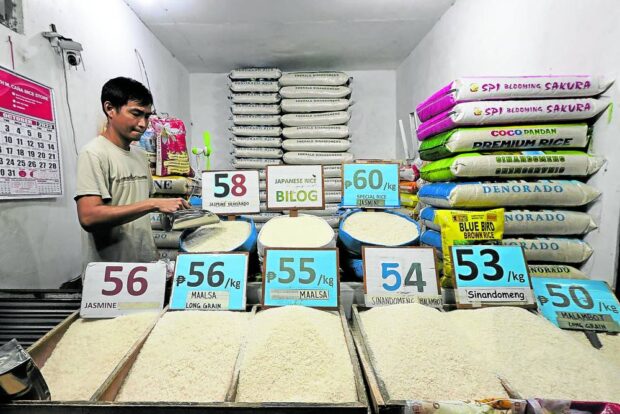DA eyes SRP on rice as retail prices still over P50 per kg

INQUIRER PHOTO / GRIG C. MONTEGRANDE
MANILA, Philippines — The Department of Agriculture (DA) is looking at the possibility of issuing a suggested retail price (SRP) for rice to temper price fluctuations across the country.
But with global rice prices surging to 15-year highs in late December last year to around $620 a metric ton from $400 in January, mainly due to poor harvests and export controls, the DA concedes that local selling prices will not be going down significantly anytime soon.
As of Friday, local regular milled rice is selling for at least P50 a kilogram, 47 percent more than the low of P34 seen in the same period last year, based on the DA’s price monitoring of Metro Manila markets.
Well-milled rice, on the other hand, retailed from P40 to P55 per kilo against last year’s P38 to P44 per kilo.
Imported regular milled rice is not available, but imported well-milled rice is sold from P51 to P58 per kilo, a big jump from P40 to P44 per kilo this time last year.
Article continues after this advertisementREAD: NEDA backs extended tariff cut on rice, corn, meat
Article continues after this advertisementREAD: Farmers’ group sees Filipinos still grappling with high rice price in 2024
Guide if overcharged
Under the Price Act, or Republic Act No. 7581, suggested retail prices may be issued for basic necessities and prime commodities for the information and guidance of producers, manufacturers, traders, dealers, sellers, retailers, and consumers.
Vendors, however, are not mandated to follow the price guide and may charge more or less than the suggested prices. But the price guide helps guide consumers on how much a product is valued, thus will know if they are being overcharged.
No more price ceiling
In a radio interview on dzBB, DA spokesperson Arnel de Mesa said the DA’s Agribusiness and Marketing Assistance Service would first consult with stakeholders before deciding on whether it would go ahead with the plan to have an SRP on rice.
But he already closed the door on the possibility of the DA imposing a price ceiling for regular, and well-milled rice, which President Ferdinand Marcos Jr. ordered in August last year to rein in runaway prices of rice.
Reservations
From Sept. 5 to October last year, the government imposed a price ceiling of P41 a kg on regular milled rice and P45 a kg on well-milled rice.
The Federation of Free Farmers (FFF), for its part, was initially open to having an SRP on rice, but FFF national manager Raul Montemayor said it would likely be difficult to implement, thus would not achieve the objective of controlling price spikes.
“There are many varieties and quality specifications of rice with different prices. So it would be difficult to determine an SRP for each type. And if the SRP is only for specific types like regular milled rice or well-milled rice, there will be a tendency for retailers to misdeclare rice as other types not be covered by SRPs,” Montemayor explained.
The Philippines is vulnerable to fluctuations in the global prices of rice as it is one of the world’s largest importers of the staple.
It has long relied on imports as local production can only cover about 90 percent of the country’s needs. The balance is brought in from abroad, mainly from neighboring Thailand and Vietnam.
The country with a population of about 100 million consumes about 36,000 MT of rice a day, or about 1.08 million MT a month.
Counting on imports
As of Dec. 28 last year, the Philippines imported 3.5 million MT of rice, according to data from the Bureau of Plant Industry.
To stabilize supply and prices, De Mesa said the DA was counting on imported rice entering the country once more before the harvest season begins.
“We need to maintain at least 60 days worth of buffer stock so we are assured of ample supply. Naturally, this is where imports come in, that’s what we want to happen,” he said.